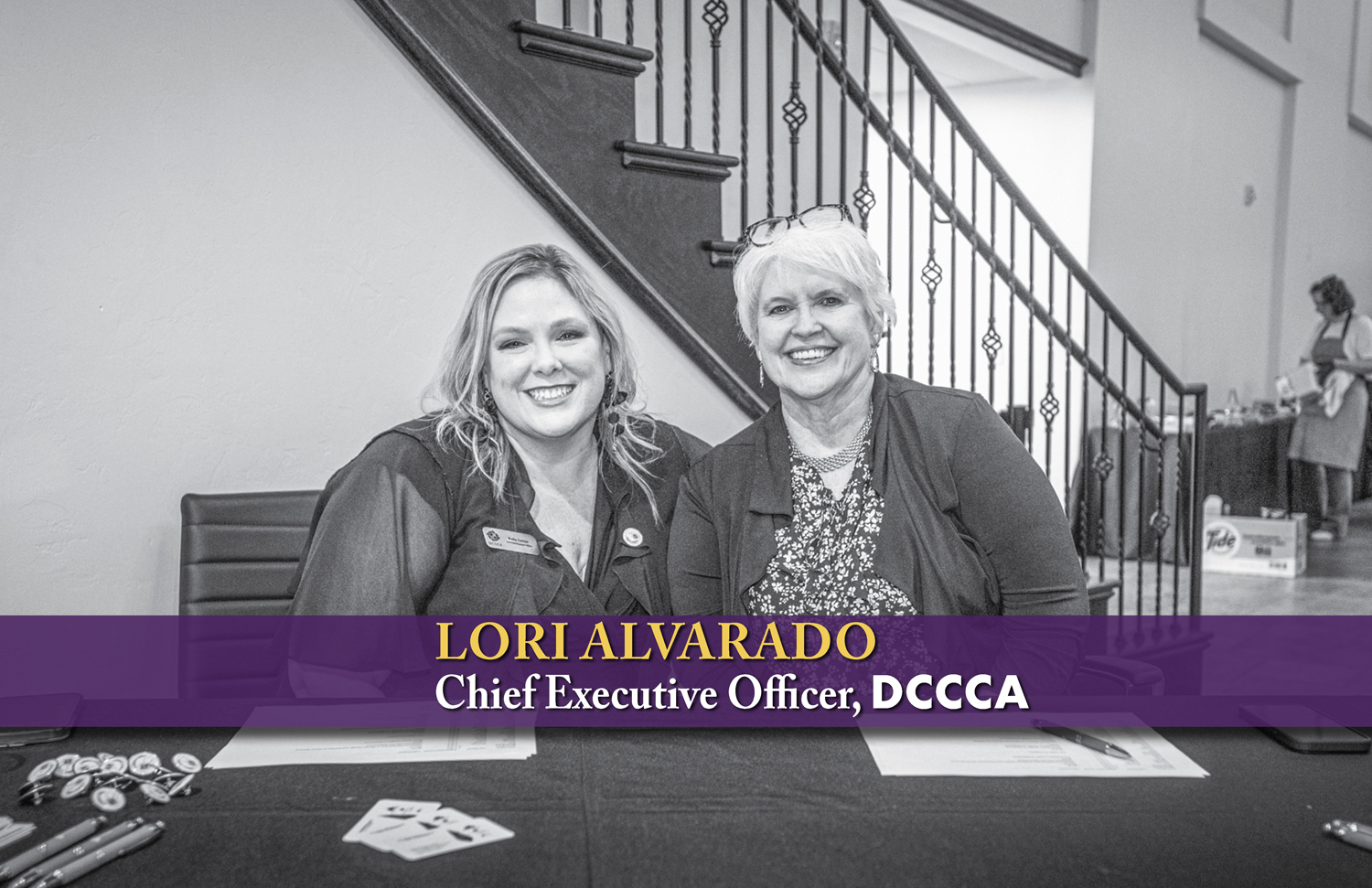| story by | Lori Alvarado |
| photo by | Steven Hertzog |
| OPEN A PDF OF THE ARTICLE |
LORI ALVARADO, CHIEF EXECUTIVE OFFICER, DCCCA

Kathy Garcia, Chief Development Officer and Lori Alvarado, Chief Executive Officer
What is DCCCA?
In 1974, a grassroots group founded DCCCA under the name Douglas County Citizen’s Committee on Alcoholism offering substance abuse treatment. Within three years, the organization secured statewide and regional contracts that grew quickly to include prevention and traffic safety (DUI, drunk-driving prevention, etc.). This local organization built a statewide business reputation known as DCCCA (pronounced “deck-uh”).
The board of directors adopted that name as its official name, dropping the words for which the acronym stood. Now the organization, with its headquarters in Lawrence, provides community and social services to improve the health, safety, and well-being of those we serve. Programs offered include substance use disorder (SUD) residential and outpatient treatment, prevention, traffic safety, family preservation and foster home support. DCCCA provides services in Iowa, Kansas, Missouri and Oklahoma.
What is DCCCA’s most important priority?
DCCCA provides high-quality, evidence-based services focused on Improving Lives. DCCCA delivers its services with integrity, understanding the trust put into the organization by its funders (city, county, state, federal and foundation). DCCCA delivers services by valuing the people and communities we serve, respecting their experiences and treating them with dignity.
An important programming priority in Douglas County comes in the form of Transitional Housing. DCCCA will build five duplexes (10 units) to support women and their children as they transition from treatment into recovery. Residents will spend six to nine months in the transitional housing as they find employment and move to more permanent housing. DCCCA currently is involved in a capital campaign to construct the housing.
How does DCCCA make an impact on the Lawrence community?
The impact of our work can be seen in a variety of ways:
- SUD treatment (First Step at Lakeview and Lawrence Outpatient) for Douglas County residents focusing on a life of recovery
- supporting prevention in the county through Engage Douglas County with adults and youth providing mental health first aid training, alcohol and drug awareness education, traffic safety education and training, and coalition support
- Naloxone (overdose reversal medication) distribution including vending machines, as well as training to administer naloxone, supporting the community and our first responders and medical providers
- recruiting, training and supporting Foster Homes, caring for youth in foster care
- through We Kan Drive assisting foster care youth in obtaining their driver’s licenses
- providing Family Preservation services with the goal of strengthening families to avoid foster care
- suicide-prevention work through implementation of school curriculum and support (Sources of Strength), and supporting communities in an effort to reduce the incidents of suicide
- supporting traffic safety by providing training to properly install child safety seats, impaired driving and elder driving safety
- and more.
What have been some of the most important aspects of your success?
DCCCA approaches each opportunity with innovation and partnership. With any funding source, our staff seeks to step outside the normal way and find solutions that go beyond the status quo of service provision. In that process, DCCCA holds itself to a high level of accountability, delivering high-quality services that meet budget and produce quality outcomes. DCCCA’s commitment to agencywide Leadership Development instills in employees their valuable contribution to our mission, Improving Lives, which adds their perspective and strengths to the betterment of clients, families and communities.
Why did you become involved with DCCCA?
My particular involvement came quite by accident. I knew someone who worked in finance at DCCCA. After spending seven years as a newspaper reporter, I wanted to do something more, find a way to give back, so to speak. I applied for a position working with youth development. While I did not get that job offer, I was offered a prevention position. I instantly embraced the work and spent 12 years working in different programs at DCCCA. After leaving the organization to work at the state of Kansas, nearly 12 years later I applied for the CEO position and have served in that role since 2013. The innovative and powerful work of the organization energizes me to continually seek creative methods in service delivery while holding high standards for performance.
What do you see as your personal responsibility and the nonprofits’ responsibility to the community?
My personal responsibility lies in three primary areas: 1) fiscal accountability ensuring that DCCCA maintains the public trust of funders and citizens; 2) quality programming adhering to evidence-based practice that produces outcomes focused on Improving Lives; 3) supporting employees by providing training and encouragement to provide quality programming. I absolutely love nonprofit work, as it allows flexibility to provide the support needed to those who seek our services. Our responsibility to the community involves seeking partnerships to address pressing issues, implementing programming aimed at improvement and tracking results.
What is the biggest challenge your industry is facing now?
LOCAL MATTERS
Our Local Advertisers – Making a Positive Impact
It’s not surprising that the need of citizens, families and communities continues to grow. It’s also not surprising that the funding to provide services to address this need does not grow at the same rate. Providing quality services means keeping pace with the growing costs of providing services (labor, facilities, support, etc.). Advocacy becomes a key skill for CEOs to develop to articulate the need, while understanding the balance of funding available.
What inspires you? Is there a specific thing, person or incident?
My inspiration comes from the stories of those we serve. I’ve witnessed many successes, but here are just a few:
- A woman whose 10-year addiction brought her to residential treatment with her two young children. After completing residential treatment and moving to intensive outpatient treatment, she sought employment, housing and supportive services in the community. Five years later, she works as a supervisor of a manufacturing company, raising her children in a strong recovery and giving back to the community that supported her.
- A letter from a police chief thanking us for providing naloxone to his officers because it saved a police officer’s life who became fentanyl exposed while sorting through evidence laced with fentanyl.
- A foster family supporting a very medically fragile infant, providing love and support, and having that child live five years beyond life expectancy because of the services and training provided by our staff.
- A community reporting that teenagers have significantly increased their seat belt usage and addressed impaired driving (as evidenced by collecting data) through our Seatbelts Are for Everyone teen-led project. This coming after the community suffered the tragic death of four seniors in a traffic crash six years before.
What seed might we plant today that could make the most difference to the future of your organization?
Stigma around substance use prevents so many people from seeking help and finding recovery. Addiction, like other medical issues, is a brain disease. It takes over one’s life until the choice to stop using is no longer their choice. A community that understands this begins to support the treatment/recovery and prevention efforts through funding, donations and volunteers, leading to recovery for those with an addiction, support for families to keep their children safe, preventing addiction through work with children and youth, reducing the incidents of drunk/drugged driving providing safety on the roadways, and supporting foster families as they attempt to provide love and support to reunify families affected by addiction.
![]()




